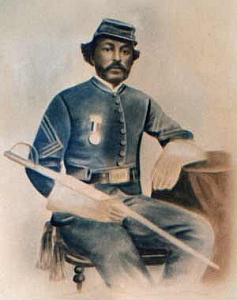See also Civil War
1834–1 Nov. 1917

Parker David Robbins, soldier, legislator, and inventor, was born in Bertie County, the son of John A. Robbins; his mother's name is unknown. A mulatto with Chowan Indian ancestors, Robbins was regarded as a free black. He had a common school education and before the Civil War acquired a 102-acre farm, in part with money earned as a carpenter and a mechanic. In 1863 he went to Norfolk, Va., and enlisted in the Union army; Robbins attained the rank of sergeant-major in the Second U.S. Colored Cavalry before his resignation in 1866 due to illness. Returning to his home in Colerain Township, Bertie County, he was one of fifteen blacks elected to the 1868 constitutional convention. He also was one of nineteen blacks elected to the 1869–70 term in the state house of representatives. The 1870 census recorded him as a 35-year-old farmer in a household consisting of 29-year-old Elizabeth, presumably his wife, whose occupation was housekeeper, and a 17-year-old mulatto female whose name is illegible in the manuscript census.
Under the national Republican administration, Robbins was named postmaster of the town of Harrellsville. While holding this position he invented and secured a patent for a new kind of cotton cultivator and a device to sharpen saws. In 1877, with the return of Democrats to power, he resigned as postmaster and soon afterwards moved to Duplin County, where he established a sawmill and a cotton gin. While there he built a steamboat, the St. Peter , which plied the Cape Fear River. He also built some houses in the town of Magnolia.
There is a photograph of Robbins in military uniform in the State Archives, Raleigh. The 1917 death certificate for Robbins indicates that he was married and that he was buried in his home burial ground.